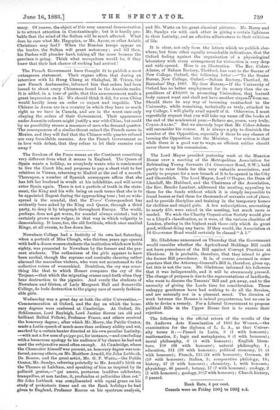Wednesday was a great day at both the older Universities,—
Commemoration at Oxford, and the day on which the hono- rary degrees were conferred at Cambridge. At Oxford, Dr. Schliemann, Lord Rayleigh, Lord Justice Bowen (an old and brilliant Balliol Fellow), Professor Fraser, and others received the honorary degree ; after which Mr. Merry, the Public Orator, made a Latin speech of much more than ordinary ability and wit, marked by a certain banter directed at his own peculiar Latinity, with not a few uses of quippe qui, for instance,—and concluding with a humorous apology to his audience if by chance he had not listed the subjunctive mood often enough. At Cambridge, where the Chancellor himself was present, an honorary degree was con- ferred, among others,on Mr. Matthew Arnold, Sir John Lubbock, Dr. Roscoe, and the great artist, Mr. G. F. Watts,—the Public Orator, Mr. Sandys, referring pointedly to Mr. Arnold's birth on the Thames at Laleham, and speaking of him as inspired by its pellucid genius,—" qui amnia, poetarnm landibus celebrates, tranquillus, at non tardus, it, profundus et pellucidus idem est." Sir John Lubbock was complimented with equal grace on his study of prehistoric times and on the Bank holidays he had given to England, Professor Roscoe on his spectrum analysis, and Mr. Watts on his great classical pictures. Mr. Merry and Mr. Sandys vie with each other in giving a certain lightness to their Latinity, and an effective allusiveness to their criticism of life.


































 Previous page
Previous page